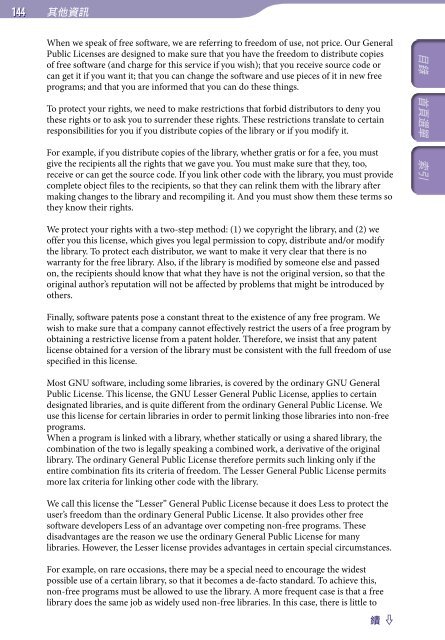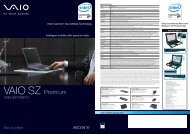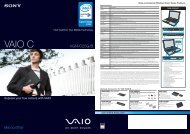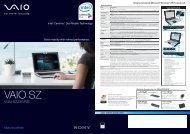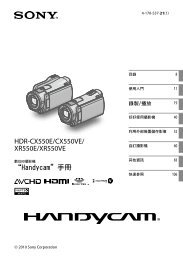æ“Â作指å—
æ“Â作指å—
æ“Â作指å—
- No tags were found...
Create successful ePaper yourself
Turn your PDF publications into a flip-book with our unique Google optimized e-Paper software.
144其 他 資 訊When we speak of free software, we are referring to freedom of use, not price. Our GeneralPublic Licenses are designed to make sure that you have the freedom to distribute copiesof free software (and charge for this service if you wish); that you receive source code orcan get it if you want it; that you can change the software and use pieces of it in new freeprograms; and that you are informed that you can do these things.To protect your rights, we need to make restrictions that forbid distributors to deny youthese rights or to ask you to surrender these rights. These restrictions translate to certainresponsibilities for you if you distribute copies of the library or if you modify it.For example, if you distribute copies of the library, whether gratis or for a fee, you mustgive the recipients all the rights that we gave you. You must make sure that they, too,receive or can get the source code. If you link other code with the library, you must providecomplete object files to the recipients, so that they can relink them with the library aftermaking changes to the library and recompiling it. And you must show them these terms sothey know their rights.目 錄 首 頁 選 單 索 引We protect your rights with a two-step method: (1) we copyright the library, and (2) weoffer you this license, which gives you legal permission to copy, distribute and/or modifythe library. To protect each distributor, we want to make it very clear that there is nowarranty for the free library. Also, if the library is modified by someone else and passedon, the recipients should know that what they have is not the original version, so that theoriginal author’s reputation will not be affected by problems that might be introduced byothers.Finally, software patents pose a constant threat to the existence of any free program. Wewish to make sure that a company cannot effectively restrict the users of a free program byobtaining a restrictive license from a patent holder. Therefore, we insist that any patentlicense obtained for a version of the library must be consistent with the full freedom of usespecified in this license.Most GNU software, including some libraries, is covered by the ordinary GNU GeneralPublic License. This license, the GNU Lesser General Public License, applies to certaindesignated libraries, and is quite different from the ordinary General Public License. Weuse this license for certain libraries in order to permit linking those libraries into non-freeprograms.When a program is linked with a library, whether statically or using a shared library, thecombination of the two is legally speaking a combined work, a derivative of the originallibrary. The ordinary General Public License therefore permits such linking only if theentire combination fits its criteria of freedom. The Lesser General Public License permitsmore lax criteria for linking other code with the library.We call this license the “Lesser” General Public License because it does Less to protect theuser’s freedom than the ordinary General Public License. It also provides other freesoftware developers Less of an advantage over competing non-free programs. Thesedisadvantages are the reason we use the ordinary General Public License for manylibraries. However, the Lesser license provides advantages in certain special circumstances.For example, on rare occasions, there may be a special need to encourage the widestpossible use of a certain library, so that it becomes a de-facto standard. To achieve this,non-free programs must be allowed to use the library. A more frequent case is that a freelibrary does the same job as widely used non-free libraries. In this case, there is little to續


